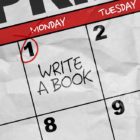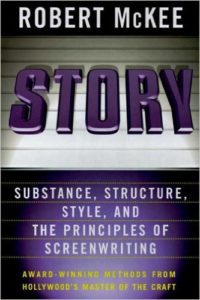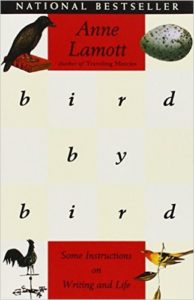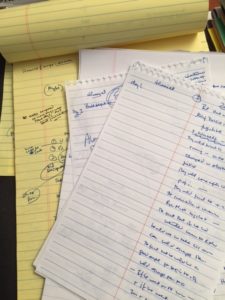 Straight off, let me be clear: writer’s funk is not writer’s block. The latter, “writer’s block” is the “condition of being unable to think of what to write or how to proceed with your writing.” Writer’s funk, on the other hand is the situation where you have churned out your target number of words, had no trouble at all– well, hardly any trouble — getting them down on paper and then you read them, and re-read them — and then you want to vomit, and throw it all in the trash.
Straight off, let me be clear: writer’s funk is not writer’s block. The latter, “writer’s block” is the “condition of being unable to think of what to write or how to proceed with your writing.” Writer’s funk, on the other hand is the situation where you have churned out your target number of words, had no trouble at all– well, hardly any trouble — getting them down on paper and then you read them, and re-read them — and then you want to vomit, and throw it all in the trash.
 Writer’s Funk in a Nutshell
Writer’s Funk in a Nutshell
As Paula Zimlicki, one of my writer friends from the Algonkian group, lamented a couple of weeks ago: “I’m in a writing funk. You know the scenario: nothing you write pleases you; you think it is all shit, and you despair of writing a novel worth being published. Writing hell in other words. Ugh!”
Yep. That’s writer’s funk in a nutshell. Know the feeling well! I also know that Paula, who is working on her first novel, In The Summer of Defiance, and I are in good company. We are not talking here about those people who blithely and fearlessly sit down to write a book without the faintest idea of structure or genre, or even grammar or punctuation. No. Writer’s funk arises out of self-doubt, and fear, and an anxiety about mastering the craft of writing. It’s a condition that flares up in new, unpublished writers striving for the publication of first novels as well as those who are already professionally published authors.
Bestselling Authors Get Writer’s Funk
Bestselling author of medical thrillers, Tess Gerritsen (Playing with Fire, and the Rizzoli & Isles series) wrote a whole blog about it a few years ago after a friend, Sandra Scoppetone, also a best selling author (Too Darn Hot) wrote this about the novel she was working on at the time: “I hate it. I don’t want to write it anymore. It stinks.”
Gerritsen said that she understood completely: “While writing my books, I’ve hated every single one of them, she wrote. “Felt they were doomed, that they’d reveal I was a no-talent fraud. That there was no way I’d be able to save the sucker from certain disaster.” She added that these feelings of self-doubt increase — not lessen– with every new published book. “You question every word you write. You actually become less confident because you grow more exacting and more critical of your own work.”
It’s Good to Hate Your Writing
 And, therein lies the conundrum: the more you hate what you’ve written, apparently the better writer you are, or will become. Robert McKee, world-renowned screenwriting guru, and author of Story, announced it at a three-day seminar I attended a couple of years ago. He said:
And, therein lies the conundrum: the more you hate what you’ve written, apparently the better writer you are, or will become. Robert McKee, world-renowned screenwriting guru, and author of Story, announced it at a three-day seminar I attended a couple of years ago. He said:
“Real writers hate writing, and hate everything they write.”
Publishing industry expert, Jane Friedman agrees. In a guest post titled, “You Hate Your Writing? That’s a Good Sign!” for Writer Unboxed she wrote: “You have to produce a lot of crap — stuff that you know is crap– before you can produce anything good. Your taste is good enough that you can tell what you’re making is kind of a disappointment to you[…] Great writers will always be critical of their own work because they have good taste.”

Dani Shapiro, an author who appeared on a Palm Beach Book Festival panel earlier this year to talk about memoirs echoes these views. In Still Writing, The Perils and Pleasures of a Creative Life she observes “It seems that every really good writer I know is plagued by self-doubt. A writer who is overly confident will not engage in the struggle to get it exactly right on the page.”
Overcoming Writer’s Funk
 So, how does an author overcome writer’s funk and “get it exactly right” when faced with words on a page that look nothing like the thrilling prose that coursed through his/her head in the shower that morning?
So, how does an author overcome writer’s funk and “get it exactly right” when faced with words on a page that look nothing like the thrilling prose that coursed through his/her head in the shower that morning?
Fortunately, for those writers who are determined to publish a novel, whether as an indie author, or through a traditional publisher, there is no shortage of advice. Unfortunately, all the advice can be boiled down to a couple of words and phrases of which the most widely used are: “rewrite, rewrite, edit, and then rewrite again” because your first draft is always going to suck.
First Drafts
 That’s right. First rule: Accept the fact that your first draft is going to be vomit-inducing for the most part. Joanna Penn, a wildly successful indie author and marketing guru has said on her website that the feeling that your writing is terrible “happens to everyone.” In a video, she explains: “If you think your writing is bad, you’re probably right[…] but don’t censor that first round of writing. Keep writing down what’s coming out of your head. You can edit when you have something to edit.”
That’s right. First rule: Accept the fact that your first draft is going to be vomit-inducing for the most part. Joanna Penn, a wildly successful indie author and marketing guru has said on her website that the feeling that your writing is terrible “happens to everyone.” In a video, she explains: “If you think your writing is bad, you’re probably right[…] but don’t censor that first round of writing. Keep writing down what’s coming out of your head. You can edit when you have something to edit.”
Anne Lamott in Bird by Bird, her bestselling “instruction manual” on writing, puts it more poetically: “All good writers write shitty first drafts […] The first draft is the child’s draft where you let it all pour out and then let it romp all over the place, knowing that no-one is going to see it.” She continues: “There may be something in the very last line of the very last paragraph on page six that you just love, that is so beautiful and wild that you now know what you’re supposed to be writing about […] but there was no way to get to this without first getting through the first five and a half pages.”
Do Not Wait For The Muse
 It’s hard work. As Stephen King confirms in his primer, On Writing: “There is a muse, but he’s not going to come fluttering down into your writing room and scatter creative fairy dust all over your typewriter (quaint!) or computer station. He lives in the ground. He’s a basement kind of guy. You have to descend to his level, and once you get down there […] you have to do all the grunt labor.”
It’s hard work. As Stephen King confirms in his primer, On Writing: “There is a muse, but he’s not going to come fluttering down into your writing room and scatter creative fairy dust all over your typewriter (quaint!) or computer station. He lives in the ground. He’s a basement kind of guy. You have to descend to his level, and once you get down there […] you have to do all the grunt labor.”
Or as the late bestselling author Michael Crichton of Jurassic Park fame used to say: “Writing is rewriting; it means going over and over and over the same material, and making it better.”
Angela Slatter, an Australian award-winning writer, in an interview for an article titled “Dealing With Self-Doubt: Tips From 7 Popular Authors” puts it this way: “I look at the story itself. Why is it failing to develop the way I want it to? Generally, because I’m trying to jam it into the wrong shape[…] I’m trying to make it grow up to be a doctor when it really wants to be a tattoo artist. I need to be fluid enough in my thinking not to try to shape the idea too harshly or rigorously. I talk to friends about the tale and sometimes that shakes loose the things that are stuck.”
Steven Pressfield in his classic The War of Art writes: “The process of self revision and self correction is a miracle […] Insights pop into our heads while we’re shaving, or taking a shower, or even amazingly, while we’re actually working.”
False Beliefs
 Writer’s funk mostly arises from “attempting to make the first draft the best [you] can write. Some believe it’s the way real writers write which is generally not true, and some believe that perfecting each chapter will relieve them of the need to rewrite, which is also not true,” says Susan Reynolds, author of Fire Up your Writing Brain. “Good books are not written, but rewritten and rewritten and rewritten.”
Writer’s funk mostly arises from “attempting to make the first draft the best [you] can write. Some believe it’s the way real writers write which is generally not true, and some believe that perfecting each chapter will relieve them of the need to rewrite, which is also not true,” says Susan Reynolds, author of Fire Up your Writing Brain. “Good books are not written, but rewritten and rewritten and rewritten.”
Specifically, as-yet unpublished authors should take note of what sci-fi Campbell Award-winning author ( Six Wakes, Book Burners) Mur Lafferty has to say in an article in Scott Nicholson’s Write Good or Die: “You will never be perfect. You will eventually finish stories and novels and achieve a sense of accomplishment […] But the story will never appear on the page the same way it did in your head. Writing is a skill.
“The closer you are to your first day of writing , the more likely you are to suck.”
Coming Out of A Writer’s Funk
And, maybe after you’ve written a second draft, and then a third, even after the fourth, you may still feel in a funk; you may still feel that your writing sucks. Well, sometimes what you think is shit, really is shit. Put it away in your bottom drawer, and give yourself points for having the good taste to recognize shit when you see it. One day, you’re going to see something in the pages of your first draft that looks half-way decent, maybe even looks like a gem or a gold nugget of a sentence or paragraph or page that gives you a springboard to a decent scene, or a great chapter, and when that happens you’ll feel you’ve come out of your funk. At least for a while.
Photo Credits: bigstockphoto.com
This resonated with me. I’m always disgusted with my first drafts of scenes and after numerous rewrites, I’m finally able to move on to the next one once the scene no longer gives me nausea.
As some of the experts say in this article, it’s good to recognize what sucks about your writing. I’m just not sure that rewriting one chapter till I got it absolutely right would work for me. I like to spill it all out and then go back to chapter one and start on a second draft.